Unit11课文学案
- 格式:doc
- 大小:75.00 KB
- 文档页数:2
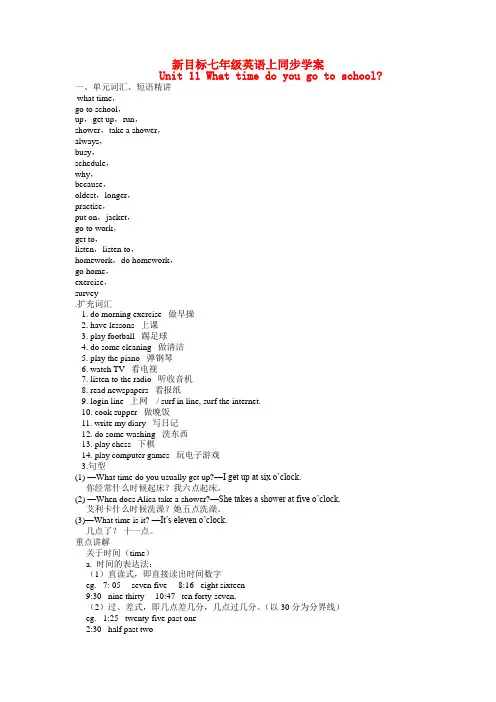
新目标七年级英语上同步学案Unit 11 What time do you go to school?一、单元词汇、短语精讲what time,go to school,up,get up,run,shower,take a shower,always,busy,schedule,why,because,oldest,longer,practise,put on,jacket,go to work,get to,listen,listen to,homework,do homework,go home,exercise,survey.扩充词汇1. do morning exercise 做早操2. have lessons 上课3. play football 踢足球4. do some cleaning 做清洁5. play the piano 弹钢琴6. watch TV 看电视7. listen to the radio 听收音机8. read newspapers 看报纸9. login line 上网/ surf in line, surf the internet.10. cook supper 做晚饭11. write my diary 写日记12. do some washing 洗东西13. play chess 下棋14. play computer games 玩电子游戏3.句型(1) —What time do you usually get up?—I get up at six o’clock.你经常什么时候起床?我六点起床。
(2) —When does Alica take a shower?—She takes a shower at five o’clock.艾利卡什么时候洗澡?她五点洗澡。
(3)—What time is it? —It’s eleven o’clock.几点了?十一点。
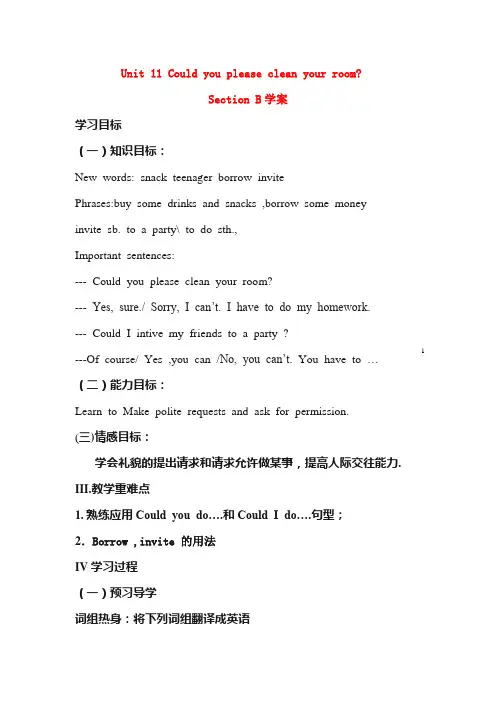
1Unit 11 Could you please clean your room?Section B 学案学习目标(一)知识目标:New words: snack teenager borrow invitePhrases:buy some drinks and snacks ,borrow some money invite sb. to a party\ to do sth.,Important sentences:--- Could you please clean your room?--- Yes, sure./ Sorry, I can’t. I have to do my homework. --- Could I intive my friends to a party ?---Of course/ Yes ,you can /No, you can’t. You have to …(二)能力目标:Learn to Make polite requests and ask for permission.(三)情感目标:学会礼貌的提出请求和请求允许做某事,提高人际交往能力. III.教学重难点1. 熟练应用Could you do….和Could I do….句型;2.Borrow ,invite 的用法IV 学习过程(一)预习导学词组热身:将下列词组翻译成英语2买些饮料小吃__________________借些钱___________打扫客厅_____________邀请我的朋友参加聚会_______________________去买东西_______________用一下你的影碟机______________________把垃圾带出去_______________整理你的床铺____________(二)自主学习1. 1a. What can teenages ask their parents to do? What do par ents ask their teenages to do? Write “parents” or “teenages”next toeach phrase in your book..2. 2a and 2b. Listen to the tape and finish 2a and 2b.(三) 合作探究1、Pairwork Use the phrases in 1a to make conversations with your partner.2、Groupwork You are having a party. Ask your partners for help. Talk about these things:go to the store buy drinks and snacks do the dishesclean the living room take out the trash.(四) 梳理归纳From this class, you should grasp:1、礼貌的要求及回答2、礼貌的请求允许及回答3.本课常用短语___________________________________________________________3 V 典题赏析1.—Can I ______this book ?—Yes, but you mustn ’t _____it to others.A.lend,borrowB.borrow,keepC.borrow,lendD.lend ,keep本题主要考查borrow 和lend 的区别。
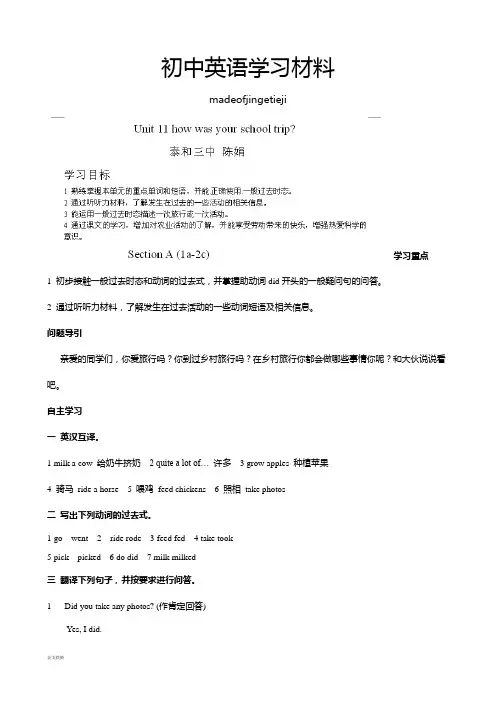
初中英语学习材料madeofjingetieji学习重点1 初步接触一般过去时态和动词的过去式,并掌握助动词did开头的一般疑问句的问答。
2 通过听听力材料,了解发生在过去活动的一些动词短语及相关信息。
问题导引亲爱的同学们,你爱旅行吗?你到过乡村旅行吗?在乡村旅行你都会做哪些事情你呢?和大伙说说看吧。
自主学习一英汉互译。
1 milk a cow 给奶牛挤奶2 quite a lot of… 许多3 grow apples 种植苹果4 骑马ride a horse5 喂鸡feed chickens6 照相take photos二写出下列动词的过去式。
1 go went2 ride rode3 feed fed4 take took5 pick picked6 do did7 milk milked三翻译下列句子,并按要求进行问答。
1 --- Did you take any photos? (作肯定回答)--- Yes, I did.2 ----Did they grow apples? (作否定回答)---- No, they didn’t.3 ---- Did he eat strawberries? (作否定回答)----No, he didn’t.四完成课本1a部分。
合作探究任务一和小组成员一起讨论一下问题。
1 Does your school have any school trips?2 What do you usually do on your school trip?图片1 参观博物馆visit museums图片2 爬山go to the mountains图片3 去农场go to the farm图片4 去动物园go to the zoo3 How was your last school trip?任务二1 听课本1b的录音,圈出Carol所做的三件事情,并按要求完成1c当中的对话练习。
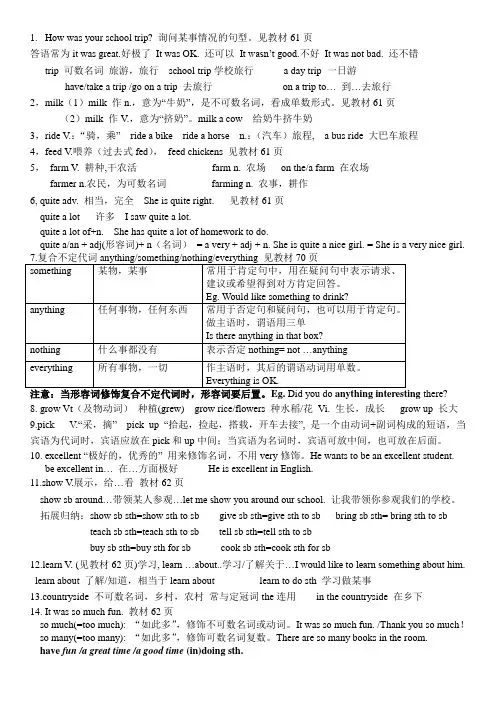
1.How was your school trip? 询问某事情况的句型。
见教材61页答语常为it was great.好极了It was OK. 还可以It wasn’t good.不好It was not bad. 还不错trip 可数名词旅游,旅行school trip学校旅行 a day trip 一日游have/take a trip /go on a trip 去旅行on a trip to… 到…去旅行2,milk(1)milk 作n.,意为“牛奶”,是不可数名词,看成单数形式。
见教材61页(2)milk 作V.,意为“挤奶”。
milk a cow 给奶牛挤牛奶3,ride V.:“骑,乘” ride a bike ride a horse n.:(汽车)旅程, a bus ride 大巴车旅程4,feed V.喂养(过去式fed),feed chickens 见教材61页5,farm V. 耕种,干农活farm n. 农场on the/a farm 在农场farmer n.农民,为可数名词farming n. 农事,耕作6, quite adv. 相当,完全She is quite right.见教材61页quite a lot 许多I saw quite a lot.quite a lot of+n. She has quite a lot of homework to do.quite a/an + adj(形容词)+ n(名词)= a very + adj + n. She is quite a nice girl. = She is a very nice girl.there?8. grow Vt(及物动词)种植(grew) grow rice/flowers 种水稻/花Vi. 生长,成长grow up 长大9.pick V.“采,摘” pi ck up “拾起,捡起,搭载,开车去接”, 是一个由动词+副词构成的短语,当宾语为代词时,宾语应放在pick和up中间;当宾语为名词时,宾语可放中间,也可放在后面。
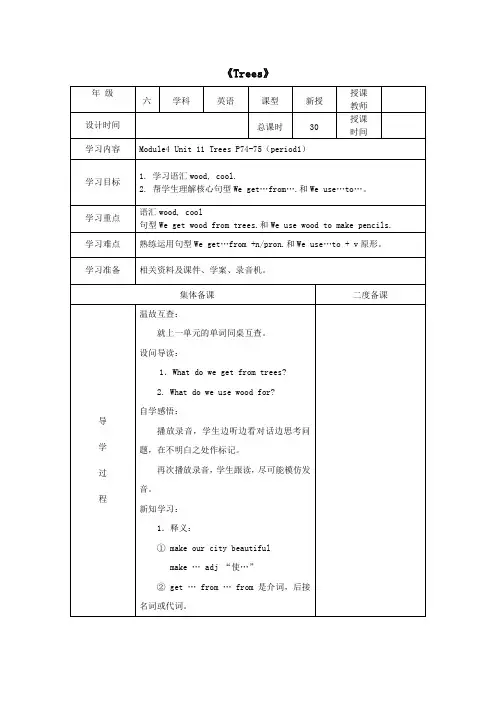
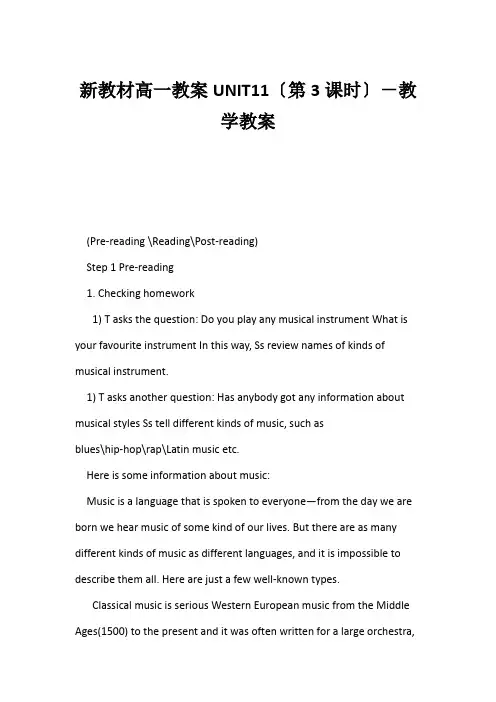
新教材高一教案UNIT11〔第3课时〕-教学教案(Pre-reading \Reading\Post-reading)Step 1 Pre-reading1. Checking homework1) T asks the question: Do you play any musical instrument What is your favourite instrument In this way, Ss review names of kinds of musical instrument.1) T asks another question: Has anybody got any information about musical styles Ss tell different kinds of music, such asblues\hip-hop\rap\Latin music etc.Here is some information about music:Music is a language that is spoken to everyone—from the day we are born we hear music of some kind of our lives. But there are as many different kinds of music as different languages, and it is impossible to describe them all. Here are just a few well-known types.Classical music is serious Western European music from the Middle Ages(1500) to the present and it was often written for a large orchestra,or for a small group of players. Many instruments can be used. A lot of music was also written to be sung as opera. Classical music is very popular and schools often teach this type of music.Jazz developed in the Southern States of North America at the beginning of last century. The black people of these states, who were originally slaves from Africa, had their own rhythms. Jazz brought classical music and African rhythms together.Blues was originally Black Country music, which also came from the Southern States of last century. It is slow, usually sad music, which is often sung by one person with a guitar.Rhythm and blues developed from the Blues in America in the 1940s. It became faster and more complex and used more instruments, e.g. saxophone, guitar, piano, drums. The music was often about city life and white musicians started playing it as well.Musicians in the 1950s developed Rock from Rhythm and Blues and it became popular with young people. It spread to Europe in the 1960s and is now known in most countries. A lot of pop music comes from Rock and Roll.Pop music developed from Rock and Roll in America, Britain and Europe in the 1960s and is now in every country. The name is used for most commercial music, i.e. music we can buy on records and hear on “pop radio〞. It is usually played by groups who often use electricinstruments and make videos to go with their records.2. Pair-workHave Ss discuss these questions in pairs.1) What kind of music do you like2) When you listen to a song, do you listen to words or the music2) Do you like to listen to music form other countries3. A gamePlay some music played by different musical instruments, ask the Ss to guess what makes the song. (piano/guitar/trumpet/drum)Teach the English names of different musical instruments on the slide: violin, trumpet, guitar, jazz drum, mouth-organ, huqin(Chinese violin) etc.Step 2 Reading1. Fasting readingHave Ss read the passage as quickly as possible to find the answer to the question: How many kinds of music are mentioned in the passage and what are they2. Careful readingHave Ss read the passage carefully and fill in the form below according to the passage.。
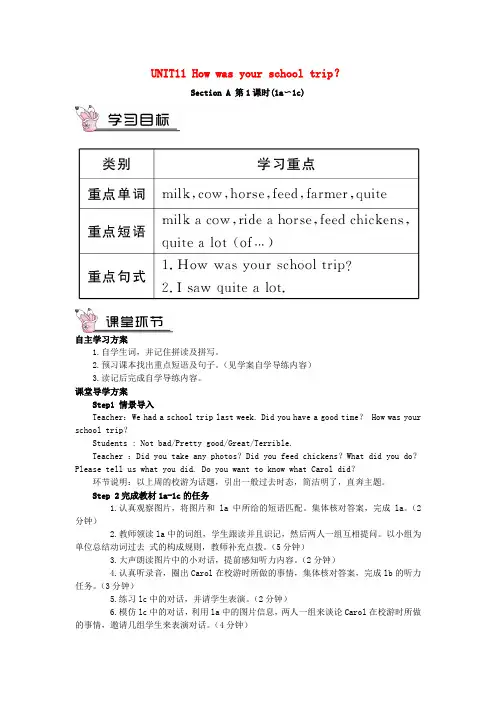
UNIT11 How was your school trip?Section A 第1课时(1a〜1c)自主学习方案1.自学生词,并记住拼读及拼写。
2.预习课本找出重点短语及句子。
(见学案自学导练内容)3.读记后完成自学导练内容。
课堂导学方案Step1 情景导入Teacher:We had a school trip last week. Did you have a good time? How was your school trip?Students : Not bad/Pretty good/Great/Terrible.Teacher :Did you take any photos?Did you feed chickens?What did you do?Please tell us what you did. Do you want to know what Carol did?环节说明:以上周的校游为话题,引出一般过去时态,简洁明了,直奔主题。
Step 2完成教材1a-1c的任务1.认真观察图片,将图片和la中所给的短语匹配。
集体核对答案,完成la。
(2分钟)2.教师领读la中的词组,学生跟读并且识记,然后两人一组互相提问。
以小组为单位总结动词过去式的构成规则,教师补充点拨。
(5分钟)3.大声朗读图片中的小对话,提前感知听力内容。
(2分钟)4.认真听录音,圈出Carol在校游时所做的事情,集体核对答案,完成lb的听力任务。
(3分钟)5.练习lc中的对话,并请学生表演。
(2分钟)6.模仿lc中的对话,利用la中的图片信息,两人一组来谈论Carol在校游时所做的事情,邀请几组学生来表演对话。
(4分钟)参考案例:A:Did Carol take any photos?B:Yes,she did. /No,she didn’t.7.小结训练。
(4分钟)(1)— What did Sam do on the farm?—He B chickens.A feedsB fedC grows(2)— C you to the zoo last Sunday?—No,I didn'.A. Do;goB. Are;going C . Did;go环节说明:听说结合,第一时间向学生传达语言目标,结对对话练习和小结训练,使语言目标得以强化。
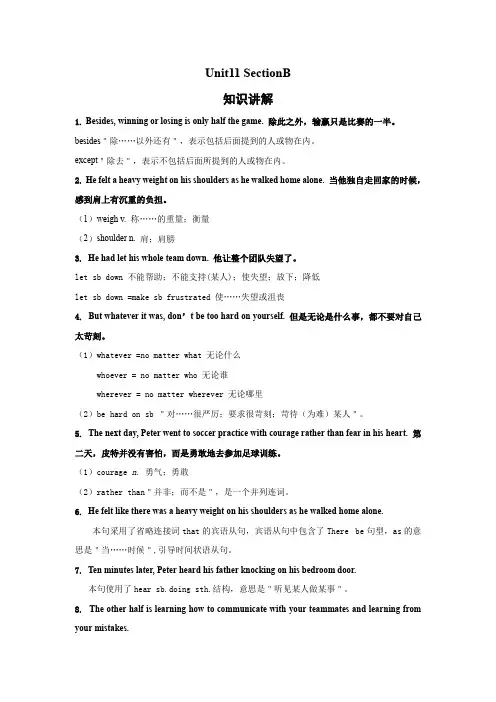
Unit11 SectionB知识讲解1. Besides, winning or losing is only half the game.除此之外,输赢只是比赛的一半。
besides"除……以外还有",表示包括后面提到的人或物在内。
except"除去",表示不包括后面所提到的人或物在内。
2. He felt a heavy weight on his shoulders as he walked home alone. 当他独自走回家的时候,感到肩上有沉重的负担。
(1)weigh v. 称……的重量;衡量(2)shoulder n. 肩;肩膀3. He had let his whole team down. 他让整个团队失望了。
let sb down 不能帮助;不能支持(某人);使失望;放下;降低let sb down =make sb frustrated 使……失望或沮丧4. But whatever it was, don’t be too hard on yourself. 但是无论是什么事,都不要对自己太苛刻。
(1)whatever =no matter what 无论什么whoever = no matter who 无论谁wherever = no matter wherever 无论哪里(2)be hard on sb "对……很严厉;要求很苛刻;苛待(为难)某人"。
5. The next day, Peter went to soccer practice with courage rather than fear in his heart. 第二天,皮特并没有害怕,而是勇敢地去参加足球训练。
(1)courage n.勇气;勇敢(2)rather than"并非;而不是",是一个并列连词。
6. He felt like there was a heavy weight on his shoulders as he walked home alone.本句采用了省略连接词that的宾语从句,宾语从句中包含了There be句型,as的意思是"当……时候",引导时间状语从句。
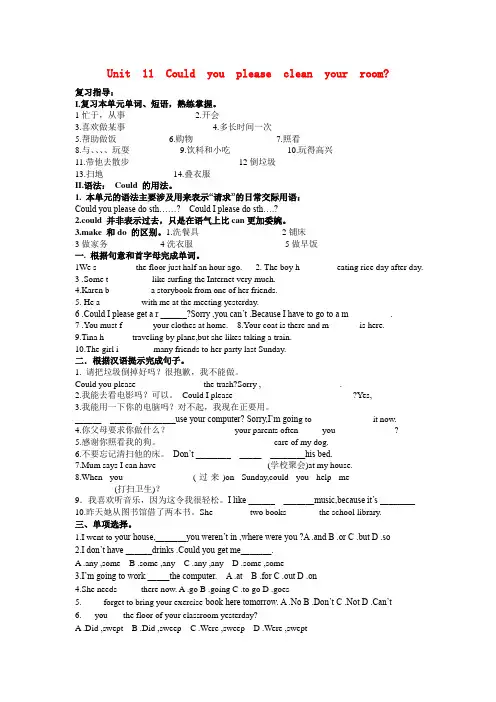
Unit 11 Could you please clean your room?复习指导:I.复习本单元单词、短语,熟练掌握。
1忙于,从事________________2.开会______________________3.喜欢做某事____________________4.多长时间一次______________________5.帮助做饭____________6.购物___________________7.照看________________8.与、、、、玩耍___________ 9.饮料和小吃_____________10.玩得高兴____________11.带他去散步_________________________12倒垃圾_______________________13.扫地________________14.叠衣服__________________II.语法:Could 的用法。
1. 本单元的语法主要涉及用来表示“请求”的日常交际用语:Could you please do sth……? Could I please do sth….?2.could 并非表示过去,只是在语气上比can更加委婉。
3.make 和do 的区别。
1.洗餐具___________________2铺床____________________3做家务____________4洗衣服_____________________5做早饭________________一. 根据句意和首字母完成单词。
1We s_________the floor just half an hour ago. 2. The boy h ________eating rice day after day.3 .Some t__________like surfing the Internet very much.4.Karen b _________a storybook from one of her friends.5. He a _________with me at the meeting yesterday.6 .Could I please get a r ______?Sorry ,you can’t .Because I have to go to a m _________.7 .You must f ______ your clothes at home. 8.Your coat is there and m_______is here.9.Tina h______ traveling by plane,but she likes taking a train.10.The girl i________many friends to her party last Sunday.二.根据汉语提示完成句子。
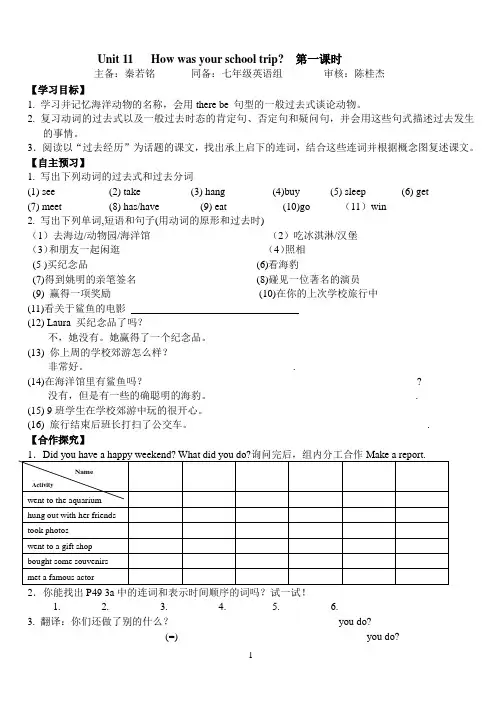
Unit 11 How was your school trip? 第一课时主备:秦若铭同备:七年级英语组审核:陈桂杰【学习目标】1. 学习并记忆海洋动物的名称,会用there be 句型的一般过去式谈论动物。
2. 复习动词的过去式以及一般过去时态的肯定句、否定句和疑问句,并会用这些句式描述过去发生的事情。
3.阅读以“过去经历”为话题的课文,找出承上启下的连词,结合这些连词并根据概念图复述课文。
【自主预习】1. 写出下列动词的过去式和过去分词(1) see ________ (2) take________ (3) hang________ (4)buy______(5) sleep_______(6) get________ (7) meet________ (8) has/have________(9) eat________ (10)go______(11)win_______2. 写出下列单词,短语和句子(用动词的原形和过去时)(1)去海边/动物园/海洋馆_______________________(2)吃冰淇淋/汉堡____________________ (3)和朋友一起闲逛__________________________ (4)照相________________________________ (5 )买纪念品______________________________ (6)看海豹__________________________________ (7)得到姚明的亲笔签名______________________ (8)碰见一位著名的演员______________________ (9) 赢得一项奖励___________________________ (10)在你的上次学校旅行中__________________(11)看关于鲨鱼的电影_______________________(12) Laura 买纪念品了吗?_______________________________不,她没有。
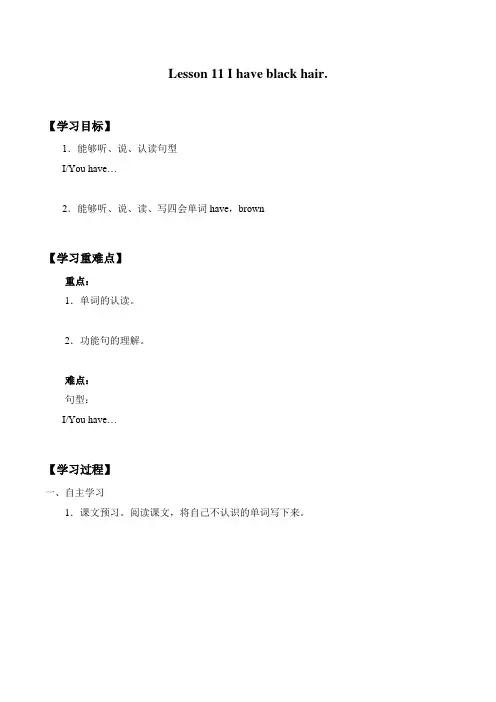
Lesson 11 I have black hair.【学习目标】1.能够听、说、认读句型I/You have…2.能够听、说、读、写四会单词have,brown【学习重难点】重点:1.单词的认读。
2.功能句的理解。
难点:句型:I/You have…【学习过程】一、自主学习1.课文预习。
阅读课文,将自己不认识的单词写下来。
___________________________________________________________ ___________________________________________________________ ___________________________________________________________ ___________________________________________________________ ___________________________________________________________2.学习单词和句型。
(1)朗读词汇:have,brown(2)朗读句型:I/You have…(3)跟读"look, listen and say"句型,并理解句子意思。
二、合作探究1.Group work:五人为一小组进行“look, listen and guess”部分的游戏练习。
2. Pair work:俩人合作学习“look, listen and say”中“u, v, w”的字母音,及在单词中的发音。
三、达标检测翻译句子1. 我有棕色的眼睛。
2. 我有黑色的头发。
3. 我有黑色的鞋子。
抄写单词三遍havebrown woman walk三年级英语下册教学设计方案Module 6 PetsUnits and thematic contentIn Module 6, pupils learn to talk about some animals and their owners.In Unit 11, Janet and her friend are at the pet shop. They see some lovely ducks and decide to buy one. In Unit 12, Janet and Ben are at a farm and they see some interesting animals.Grammar and communicative functionsAsking and answering Yes/No questions about existence:Are there any cats in your shop?Yes, there are.No, there aren’t.These and those for referring to people and things in the plural, e.g. Those are lovely. These two rabbits are white.Many for indicating large quantities, e.g. We have many dogs.Third-person plural pronoun They. E.g.They have… They’re …Whose for asking questions about possessions. E. g. my/your rabbits…Apostrophe-s for indicating possession, e.g. They are my cousins.Vocabulary:Fish-fish, monkey-monkeys, mouse-mice, rabbit-rabbits, duck-ducks, chicken-chickens, bird-birds, dog-dogs, cat-catsFarmer, friends, everyone, littlePhonicsDifferent pronunciations represented by the vowel letters a, e, I, o, u, yLearning outcomes:Ps will be able to:Ask about the possible existence of something by using “Are there any …?”Give short answers to such questions using “yes, there are. No, there aren’t.”Indicate plural quantities with these and those.Indicate a large quantity using many.Refer to people, animals and things in the plural using they.Ask about possession using whose.Talk about possession using my and you, and the apostrophe-s.Call some common pet animals.Provide simple descriptions of some common pet animals.Unit 11 They’re lovely一、教学内容:《义务教育教科书英语三年级下册》Unit 11 They’re lovely 新授课二、学情分析:三年级下学期的学生经过了将近三年的英语学习,对英语课堂学习任务积极参与,乐于模仿,他们有一定的英语听说读写能力,上学期已经学过的动物词有cat, dog, rabbit, bear, 口语学习过的有mouse,fish, bird, duck, frog, turtle, elephant, kangaroo, monkey, lion, tiger, chicken, 能够表达自己喜欢的动物I like …也可以表达Andy is a monkey. 之类的句子。
湖北省襄阳市第四十七中学九年级英语《Unit 11 Could you please tell me where the restroom》教学案4 人教新目标版教学目标阅读短文,理解短文,能够仿照课文进行写作,提高写作能力教学重点提高学生的阅读能力;培养学生的写作创新能力;教学难点宾语从句的用法课时安排 4 教具准备录音机等教法小组学习,自主学习学习过程自主空间【课前预习】1.词组翻译:1.世界上最大的水上滑梯________________________2.一个度假的好地方______________3.装扮成小丑__________________4.上舞蹈课___________________5.又便宜又好吃______________6.度过许多幸福时光______________7.漫步在历史博物馆____________8科学博物馆________________9.在农贸市场_______________【词句理解】1、staff名词 n. “(全体)员工”是集合名词,指整体时看着单数,指成员是看着复数。
(1)The staff of this college____________(be)excellent.(2) The staff in this school______________(be)united. (复数为staves) “五线谱”.“支柱,支撑”The boy was the staff and pride oftheir age.这男孩是他们老年时的依靠和骄傲。
【课堂导学】I.Talk about the picture at pag e 90 by answering the followingquestions:1.What kind of place isit?______________________________________.2.What activities can tourists dothere?____________________________.3.What places can touristsvisit?__________________________________.4.The kids didn’t have fun ,didthey?______________________________.5.What can tourists learn in theplace?_____________________________.II.Read3a and fill in the chart.plete the guide to Sunville using the information from 2a and 2b. IV.Write a guide to your city or town.Suppose you are a guide, introduce a good place in your hometownto others. Hello, welcome to our city. Now let me tell you something about it._______________________________________________________________【巩固拓展】一. 选择填空( )1. Tha t is a good place ______ hang ou t.A.forB. onC. toD. With( )2. Do you know ________ there are any good restaurants _______ this street? A. if, on B. how, on C. if, to D. where, to ( )3.I thought he _______ to see his mother if he _______ time. A.will go…has B.will go …will haveC.would go …would have D.would go …had( )4. When they got to the cinema, the film _______ for the ten minutes.A.had been on B.has begun C.began D.had begun( )5.The teacher didn't begin her class_______ the students stopped talking.A.until B.because C.after D.When( )6.If it _______ tomorrow, we'll go to the Great wal l. A.doesn't rain B.won't rain C.not rains D.isn't rain( )7、I want to know how long_______.A.has he been back B.has he come backC.he has been back D.he has come back( ) 8、Do you know how much hot water_______?A.Mum is needed B.does Mum need C.Mum needs D.did Mum need二、根据汉语补全句子。
Unit 11 The Sound of The World完整教案包括(口语,单元知识要点等)(新课标版高一英语上册学案设计)【交际用语】1.征求对方对某事、某人或某物的客观或主观看法常用句型:What’s.…like? What do you think of...?How do you like.…? What/How about.…?What’s your position on...?What’s your opinion of...?How do you feel about.…?2.回答对方对某事、某人或某物的客观或主观看法It’s....That’s a good idea.I’m afraid I…如:-How about going to the cinema?去电影院如何?-l’m afraid I cant go with you.I have a lot of homework to do'恐怕我不能和你去,我有许多家庭作业要做。
-What do you think of the book?你认为这书怎么样?_It’s interesting.很有趣。
-What’s the weather like today?今天天气怎么样?_It’srainy有雨。
3.征求对方的忠告或意见Can I ask you for some advice? What can you suggest?What can I do before。
.。
?4.回答对方的忠告或意见I suggest that... Maybe it would be better to.…Personally, I think... from my point of view,I think.…As far as I am concerned,…, I reckon(估计) that...You should..。
You had better…如:-I want to go there alone.What can you suggest?我想单独去那儿,你以为如何?-I suggest that you should not go there alone,我建议你不要单独去那儿。
Unit 11 Sad movies make me cry.【学习内容】Sad movies make me cry. Section A 1a-2d ( Period 1 )【学习目标】1.掌握重点单词和短语:rather ,drive, lately, friends hip, would rather, the more…the more, be friends with sb. leave out等。
2.学习并掌握make的用法。
3.通过交流和表达,掌握学习宾语补足语的用法。
学习重点:学习并掌握make的用法。
【自主学习案】准确翻译下列短语。
1.宁愿________________2.越…越…________________3. 成为(某人的)朋友______________4. 忽略,不提及5.那种音乐使我昏昏欲睡。
_________________________________________________【合作学习案】Step 1. 知识梳理。
1. have fun with sb.和某人玩得开心=enjoy oneself=have a good time2. the more…the more… 越…越…,表示一方程度随着另一方程度的增减而平行变化。
Eg. The more he gets, the more he wants.3. lately adv. 最近,不久前,与recently同义。
4. be friends with sb.成为某人的朋友,注意friend必须用复数。
5. leave out不包括,不提及,忽略。
【巩固训练案】选词填空。
crazy, nervous, relaxed, cry1. The sad movie made me .2. Waiting for the bus drove me .3. The loud music made me .4. The soft music made me .【学习内容】Sad movies make me cry. Section A 3a-4b ( Period 2 )【学习目标】1.掌握重点单词king; power; prime; minister; banker; fame; pale; queen; examine; palace; wealth;grey; lemon; uncomfortable等。
Unit 11 Sad movies make me cry(第1课时)一、学习目标知识目标:1、能够使用Make sb +形容词来表达自己的心情。
2、掌握关键词:the more the more leave out friendship3、句型: Loud music makes me tenseSad movies make her want to leave能力目标:正确运用短语:be supposed to, should do something ,情感目标:本单元以谈论“习俗”为话题,了解各地不同的文化知识,从而让学生知道哪些是应该做的,哪些是不应该做的,要学会尊重不同的文化,养成良好的行为习惯,培养学生的学习兴趣。
二、自主梳理1. preparation for lessons before class.Do the exercise互动)知识预览。
2. Look at the bulletin board and read about ways you could help people.Then list other ways you could help people.3. Listen to the tape about 1b, and complete the sentences.4 .Do 1c in pairs. Then check them.5.Listen to the tape ,do 2a,listen again, do 2b, Check the answer ingroups.6 .Do 2c, work alone, and check it together.7. Remember the grammar focus in pairs.三、重点领悟1. make 的用法1)make+宾语+宾语补足语形容词做宾语补足语,表示宾语的特点,性质,状态等。
九年级英语Unit11 Rain das ae esad学案九年级英语Unit11Raindasaeesad学案SetinAnledgeai::theusefiprtantrdsandphrasesAbilitai:TalabuththingsaffetuEtinai:Shareurnideasithsebd教学重点:语法ae的用法。
教学难点:阅读3a并能正确地回答下列问题。
Learningsteps:Step1:情景导入:TalabutaplaeunStep2:自主学习:a、Latthetrestaurantsbelhihuldulietgt?h?、2PairrStep3:合作互动:3a ReadtheartileThenriteanserstthequestinsbel Step4:梳理归纳:uldrather2s与suh3ner4therefrehard6serve7eep8如何来询问某人对某事的观点?9ae典题赏析:ealllveissangShealasaesherhistrlassver_____AinterestBinterestsinterestingDinterested剖析:句意为:咱们都喜爱杨教师。
她老是让她的历史很有趣。
此题第一考查ae+n+ad结构,不是形容词,故排除;interesting是指事物本身很有趣,而interested是“对感爱好”,那个地址是说历史很有趣,应选。
2Thisis_______IantedAthenehatBhihnehihDthene剖析:此题考查宾语从句。
句意为:这是我想要的那个。
强调thene,关系代词用that,但不能用hat,A错;B项hih前无先行词,B错;项ne前应加the,错,应选D。
中考链接一、单项选择ateis____bus_____shean’thaveapiniithusthiseeend As…thatBt…ts…asDsuh…that2—DinnerisreadHelpurself!---!It_____deliiusuldupleasetellehtit?AtastesBlssundsDfeels3—anIeattheae,u?--es,uan____uustashurhandsfirstAButBSrDTill4Ihavebeenringshardthesedasfrthebigexa,Ifeel______I’afraidIan’tpassitArelaxedBstressedutfrtableDrelaxingTiegesbsfasteustneverissthehanetshlveturparentsanda ethe_____huhtheeantusAtnBningnDne6Theenuhassangdthings!Ian’tdeide_______AhatteatBhteathereteatDhenteat7LiLei’srdsadeher_________AhappilBangrilringDangr8Thisexeriseis_____diffiult______As;thatfefusandBs;thatfefusanditt;frannefustdDt;frannefustdit9Iuldrather_______uttnightthan_____balneatheAntg;tleaveBntging;leavingntg;leaveDdn’tg;tleave0Ias_____bsan_____thingsAnfusing;nfusingBnfusing;nfusednfused;nfusedDnfused;nfusing二、首字母填空FrApril1thXX,sevenillintietsfrXXBeiinglpishavebeenns_ ______2aitbefreubuthatathLet’s________3Thereisafausp_________infatr4Thereeberts______pepleallthetieThere’reani________fgdpepleandgddeeds能力提升任务型阅读Thinflifeasagaeinhihuareplaingithfiveballsintheairunae ther,fail,health,friendsandspiritandueepallftheintheairu illsnunderstandthatrisarubberballIfudrpititillbunebaButthetherfurballs,fail,health,friendsandspirit,areadefg lassesIfudrpnefthese,theillbebrenTheillneverbethesae uustunderstandthatandtrthavebalaneinurlifeH?Dn’tldnnurrthbparingurselfiththersItisbeauseearedifferent andeahfusisspeialDn’tlettherpeplesetgalsfrunlunhatisbestfrurselfDn'tgiveuphenustillhavesethinggiveNthingisreallverun tiltheentustptringDn’tbeafraidtfightdiffiultiesItisbtainghanesthatelearnhtbeDn’tshutlveutfurlifebsaingit'sipssibleThequiestatreeivelvei stgiveit;thefastestatlselveisthlditttightl;thebestateeplv eistgiveitingsDn’trunthrughlifesfastthatufrgettnlhereu’vebeen,butalshereuaregingDn’tbeafraidtlearnnledgeiseightlessIt’satreasureuanalasarreasilDn’tusetierrdsarelessluan’tgetthebaLifeisntapetitin,butatrip,stepbstepesterdaishistrtrrisaster,andtdaisagift:that’sheallit “thepresent”依照短文内容简要回答下列问题。
doesn’t mind How about …?, in fact, …2.初步运用What do you think of …?这一句型,来谈论喜欢和不喜欢的事物。
一、课前预习:找出下列词组(65,66页)1、认为,想起____________2、谈话节目________________3、肥皂剧________________4、体育节目______________5、sitcom=situation comedy_________6、游戏节目_____________7、不介意_______________ 8、不能忍受_______________9、实际上________________ 10、 ......怎么样?_________________二、重难点突破(一)What do you think of ...?= How do you like...? 你认为......怎么样?(谈论对事物的喜好有很多方法) 回答有:1.如果你爱某样东西,可以说“I love…”。
如:I love eating ice-cream. / I love travel.She loves Chinese food. / I love to swim.2.如果你喜欢某样东西,可以说:“I like…”He quite likes going to the cinema. /I like cooking.3.如果你既不喜欢也不讨厌某样东西,可以说“I don’t mind…”I don’t mind doing the housework. /I don’t mind walking to work.4.如果你不喜欢某样东西,可以说“I don’t like…”,“I dislike…”She doesn’t like cooking very much. /I dislike wasting time.5.如果你很不喜欢某样东西,可以说“I can’t stand…”,“I hate…”I don’t like sport at all. /He can’t stand his boss.一般用like的话,则要跟名词或动名词,如:I like something or like doing something。
第1页 Where there is a will, there is a way.课题 Unit 11 Friendship学习目标:(一)知识目标:To train and improve the reading ability of the students. (二)能力目标:Have the students master some reading skills.(三)情感目标:Make the students know more about friendship and how to make friends. Step1: 导入(2 minutes )Revision about the words of this unit. Step2: 自学(15 minutes )①Get the Ss to read the passage by themselves and decide T or F.( ) 1.We may get on well with many people, but we make friends with only afew of them.( ) 2.People have different kinds of friends.( ) 3.Close friends are those who can share joys and sorrows with you. ( ) 4.A good friend is someone who will do anything for you. ( ) 5. A good friend is someone you can rely on when you are in need . ( ) 6.A chess partner is not a friend. ② Discuss the following questions in groups. 1. What should we do when our friends are in sorrow.2. We may get on well with many people. But why do we usually make friends with only a few of them?3. What kind of person do you think you can rely on?Step3:讨论 (10 minutes ) Discuss the answers in groups with your teammates. Step4:展示(8 minutes ) Please show your answers to the whole class. Step5:点评Step6:检测(3 minutes )Read the whole passage.Step7:反思 Write down what you have learned today on your notebooks(整理笔记)Step8:应用 Fill in the blanks. (7 minutes )We may ______ ______ _______ ______ a number of people, and we usually make friends______ them. You may have many good friends but only _____ _____ ______ them are your “ close friends ”. A close friend is someone who is able to _______ joys and sorrows _______ you. This is a person you can ______ ______ when you need help, and this is a person to whom you ______ ________ ______ lend a helping hand.Friendship play ______ _______ _______ in our lives. And it is one of life ’s greatest __________. Yet it would be ________ ________ to expect a friend to do everything for you. So we must learn to make friends and cherish(钟爱;珍视) friendship.第2页 Where there is a will, there is a way.课题 Unit 11 Friendship学习目标:(一)知识目标:To train and improve the reading ability of the students. (二)能力目标:Have the students master some language points.(三)情感目标:Make the students know more about friendship and how to make friends. Step1: 导入(5 minutes )Get the students to read the text. Step2: 自学(15 minutes )①Get the Ss to read the passage by themselves and find out the compoundsentences(找出文中复合句).1.We may have many friends, but we often don ’t clearly understand how we make friends.句中划线部分是由_______引导的___________ 从句。
完成句子: 1)Please let me know ___________________________ .(我能为你做点什么)2)Do you remember ________________________?(我们何时第一次见面的) 2. “Best friends ” or “close friends ” are usually people who have known each other for a long time.A close friend is someone who is able to share joys and sorrows with you. This is a person you can rely on when you need help.This is the person to whom you are willing to lend a helping hand.以上四个句子中划线部分均为________ 从句。
请找出先行词和关系词。
3. As a French writer said, “Don ’t walk in front of me.”As Coubertin once said,“The important thing is not winning, but taking part.” 以上两个句子中as 引导的是__________________从句。
4. 课文第二段最后两个句子均为______句,其中if 引导的是________从句.② Deal with the language points.1.It would be too much to expect a friend to do everything for you. 句中 it 作________ 主语,真正主语是_________________________. 1) 学习英语很容易。
________________________________________. 2)找个好朋友很难。
________________________________________.Step3:讨论 (5 minutes) Discuss the answers in groups with your teammates. Step4:展示(10 minutes) Please show your answers to the whole class Step5:点评Step6:检测: 翻译句子1)朋友在我们生活中起着重要的作用。
_______________________________________________________2)关系密切的朋友是那些能与你同甘共苦的人。
_______________________________________________________ 3)友谊是生活中最宝贵的财富之一。
_______________________________________________________ 4)翻译短语1 play an important part in… ______2 in our lives _____________3 make friends with…_____________4 get on well with… ____________5 a number of + 可数名词复数_______6 a few of them______________7 may have + 过去分词 He may have understood the problem._______8 each other ______________________9 since childhood ______________ 10 in fact ___________________11 different kinds of ________________ 12 such as _________________13 choose … for …______________ 14 play with… _________________15 play chess _______________ 16 close friends _____________17 for a long time_________________ 18 share joys and sorrows_________19 rely on __________________ 20 be willing to do_____________21 lend a helping hand to sb.__________ 22 one of life’s greatest treasures______23 too much ______________ 24 expect sb. to do sth.__________25 do everything for you____________ 26 a French writer_____________27 in front of …_________________Step7:反思 Write down what you have learned today on your notebooks(整理笔记)Step8:应用 (15 minutes) Writing:以 Friendship 为题写一篇短文.。